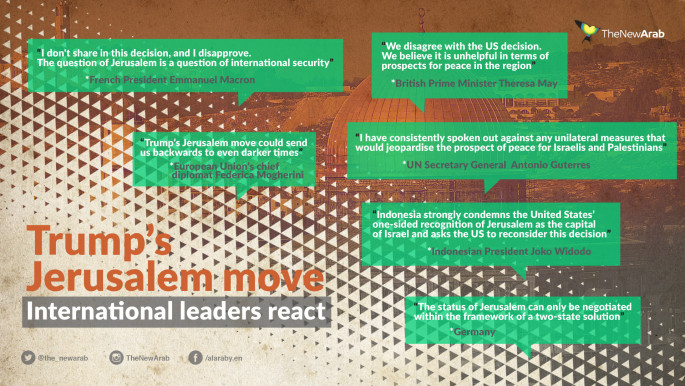
Even for US allies, Jerusalem move takes pretence off the table
The vote rejected the US decision and reiterated the internationally held standard that Israel has been occupying East-Jerusalem illegally since 1967.
Although the vote is entirely symbolic, it did carry a certain air of defiance against the global status quo. Indeed, Trump's ambassador to the UN, Nikki Haley, had used her time in the run up to the vote to threaten other member states. She repeated that the US would "remember" how other countries cast their ballots when the time came to contribute to the UN, exercise US diplomatic power for an ally, or give aid.
These threats were undoubtedly, in the main, empty. The US does not take part in such activities out of the goodness of its heart, or fond altruism, but rather to increase its influence around the world, tying smaller countries' economies to its own.
Nonetheless, its power and influence are not in question, and it is worth noting that numerous countries that enjoy special political, military and economic relationships with the US, such as Egypt, Jordan and even Saudi Arabia, also voted in favour of the resolution.
Similarly, European allies to the US, among them France, Germany and the UK, voted for the motion, despite pressure from Washington.
In the aftermath of the vote, Mahmoud Abbas' spokesperson, Nabil Abu Rudeina, declared the vote demonstrates "that the just Palestinian cause enjoys the support of international community".
Israel's envoy to the UN on the other hand, in one of the more hallucinatory contributions to the debate, accused those voting for the motion of being "puppets" whose strings were being pulled by their "Palestinian masters". Behind both these grand statements however, lies a more complicated reality.
Across the Middle East and North Africa (MENA), undemocratic regimes enjoy widespread support from the USA.
 |
The post-Oslo years allowed them to have their cake and eat it |  |
From the oil states in the Gulf, to the monarchies of Jordan or Morocco and the military junta in Egypt, many regimes in the region represent the defeat of Arab nationalism and anti-colonial movements, and the growing rapprochement with the US. A central aspect of this shift has been the growing integration of Israel in the region, and a normalisation of relations with the colonial state.
This process is visible in regional accords as well as economic and diplomatic connections. It was also accelerated considerably by the Oslo accords and the so-called peace process, which allowed regimes in the MENA region to peddle the idea that given the Palestinian leadership was involved in active negotiations and a normalised relationship with Israel, so too could they.
This tension between the governments of the region and their populations exploded on to the scene with the 2011 wave of revolutions across the MENA. People chanted for the downfall of their regimes, as well as the liberation of Palestine. In Egypt for example, the masses shut down the Israeli embassy.
 |
|
In Europe, the myth of a "still-possible-two-state-solution-if-everybody-just-came-to-the-table" has played a similar role for western governments, whose political commitments and economic interest lead them to favour Israel and ignore Palestinians, but whose populations identify in large numbers with the Palestinian struggle for freedom and liberation.
As the Boycott, Divestment and Sanctions (BDS) movement grows within civil society, governments in the West are doing their best to increase legal and political pressure on their own populations.
However, if these moves can slow down its development, the tide has clearly turned. The world demands justice for Palestine, and Israel's free hand in expanding its colonial endeavours is increasingly becoming a point of friction between European (and North American) governments and their populations.
Read more: International complicity means one-state is already a reality
In this context, Trump and Netanyahu's approach of aggressive, rapid, and visible assault on international law and Palestinians' human rights poses a problem to their allies both in the region and across the world.
The post-Oslo years allowed them to have their cake and eat it. They could claim concerned engagement with the so-called two-state solution and peace process, while effectively continuing to allow Israel's expansionist policies, discriminatory laws and murderous military assaults to continue unchecked.
Visible moves by Israel and Washington to bury the pretence and push forward without the justifying framework of Oslo is making this approach impossible.
In this sense, the UN vote should be seen as part of a series of attempts by allies of both the US and Israel to put the brakes on this "in plain sight" approach, and return to a more surreptitious method.
 |
The UN vote should be seen as part of a series of attempts by allies of both the US and Israel to put the brakes on this 'in plain sight' approach |  |
It is a desperate attempt by Israel's allies to continue to be able to square popular solidarity for the Palestinian struggle with economic interests and ideological commitment to Zionist expansion in Palestine. Progressive movements everywhere are duty bound to make these efforts as hard as possible.
The demand for Boycott, Divestment and Sanctions against institutions and companies that profit from the expropriation, oppression, and elimination of the Palestinian people, needs to be amplified.
It also needs to be integrated within our broader struggles for justice at home - within the labour, student, and liberation movements.
By holding our governments accountable, and by maintaining mounting pressure, we can exacerbate the tensions between Israel and its allies, giving the Palestinian people more space to organise and fight back.
Votes within international bodies, like the UN, are neither the beginning nor the end of our efforts. They are, however, a good indicator of our advances.
Malia Bouattia is an activist, the former President of the National Union of Students, and co-founder of the Students not Suspects/Educators not Informants Network.
Follow her on Twitter: @MaliaBouattia
Opinions expressed in this article remain those of the author and do not necessarily represent those of The New Arab, its editorial board or staff.
![Nikki Haley UN [Getty] Nikki Haley UN [Getty]](/sites/default/files/styles/large_16_9/public/media/images/08895FA8-239E-4F59-912C-3F7DC3FB907A.jpg?h=d1cb525d&itok=fgMLTsEv)



